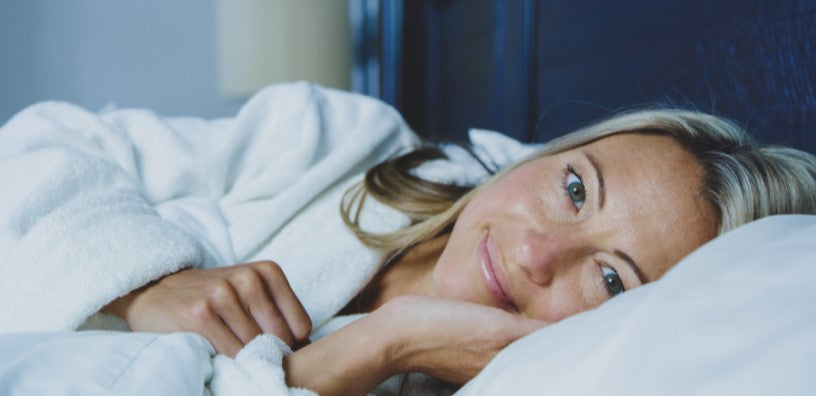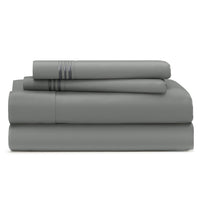
Sleep Quality vs Sleep Quantity: How to Improve Your Sleepless Nights
If you’ve been waking up feeling groggy and tired even after a full night of sleep, you might be experiencing poor sleep quality. Sleep quality and quantity go hand in hand.
If your sleep isn’t restful, you should ask yourself the following questions:
- Do you often feel groggy in the morning, even on nights when you’ve gotten enough sleep?
- Do you regularly wake up more than once per night?
- Is your focus impaired throughout the day and you’re not sure why?
- Have you noticed mood swings on a daily basis?
- Do you wake up overheated or with night sweats because of your bedding?
- Does it take you more than 30 minutes to fall asleep each night?
If you answered yes to one or more of these questions, keep reading to learn how you can improve your sleep quality, thus your sleep quantity.
What is Sleep Quantity?

Sleep quantity is the measurement of how much sleep you get each night. Sleep quantity can be easy to measure [14]:
- Are you getting the recommended amount of sleep per night, about 7 to 9 hours for adults?
Factors that Could Be Affecting Your Sleep Quantity:
So, sleep quantity and sleep quality are different, but they work together. If you’re an adult, you need to be getting at least 7 hours of sleep each and every night to be at your best every day. Do you feel out of sorts often, or unable to focus? You might not be getting enough sleep! Your sleep quantity can be affected by [13, 12, 11]:
- Lighting
- Room temperature
- Eating habits
- Caffeine before bed
- Pre-bedtime routines
- Technology before bed
- Cotton bedding that traps heat
What is Sleep Quality?

Sleep quality is the measurement of how well you sleep each night. Sleep quality can typically be measured by the following [2, 3, 6]:
- You fall asleep with ease, usually as soon as you get into bed.
- You can stay asleep throughout the night.
- If you do wake up in the middle of the night, you can easily fall back asleep within at least 20 minutes.
- You feel well-rested and energized when you wake up in the morning.
Factors that Could Be Affecting Your Sleep Quality:
There are a lot of possible reasons why you’re not getting the best night’s rest. As always, we recommend consulting your professional caregiver first to learn more about your overall health. If you feel like you need some much needed zzzz’s, check out these possible reasons your sleep quality is lacking [13, 12, 11, 10, 9, 8, 7, 6]:
- Poor sleeping habits
- Consuming too much caffeine
- Consuming too much alcohol
- Irregular sleep schedule
- Stress and anxiety
- Stuffy sheets that cause night sweats
- Chronic health conditions
- Chronic lung diseases
- Asthma
- Acid reflux
- Chronic pain
- Sleep apnea
- An undiagnosed sleep disorder(s)
Some Signs of Poor Sleep Quality:
Poor sleep quality is no fun. Have you ever woken up after a solid 8 hours of sleep, but still felt dreary and tired? That’s poor sleep quality for you. If you have poor sleep quality [1, 2, 3, 4, 15]:
- You might take more than 30 minutes or more to fall asleep each night.
- You might be waking up more than once per night, and lying awake for more than 20 minutes before falling back asleep.
- You might have difficulty concentrating and/or focusing when you’re awake.
- You might notice that your skin has begun to break out, or you are developing dark circles under your eyes.
- You might have cravings for junk food more than usual. You might notice weight gain.
- You might notice more mood swings and an increase in stress and anxiety.
What Can You Do?

Not to worry! You can improve your sleep quality by [11, 5, 4, 10, 13, 15]:
- Don’t use any form of technology for at least 30 minutes before bed. Turn it off! Blue light affects both your quality and quantity of sleep.
- Make a consistent sleep schedule for yourself. If you’re an adult, you’ll want at least 7 to 9 hours of sleep each night. Going to bed too late or too early can hinder the quality of your sleep.
- Set the thermostat in your bedroom to between 60 and 67 degrees Fahrenheit (15.6 to 19.4 degrees Celsius).
- Don’t drink caffeine or alcohol right before bed, which might disrupt your sleep.
- Come up with a relaxing pre-bedtime routine that will calm your nervous system, like reading a book, taking a bath, or meditating before falling asleep.
- You can even create your very own calm, relaxing oasis with the tried and true Cosy Lavender Linen Spray, which was inspired by aromatherapy and formulated without aerosols, dyes, propellants, and synthetic fragrances, making it perfectly safe for those with sensitive skin and noses.
- Switch your old sheets for bamboo viscose blended sheets. Bamboo viscose stays cooler, and carries thermal-regulating properties that balance your body’s temperature as you sleep.
Remember how we mentioned bamboo viscose? If you know it’s time to switch out your old, heavy, stuffy sheets, you need to invest in Cosy Luxury Sheets. You’ll sleep blissfully throughout the night, because our unique fabric is one of the most breathable and lightweight fabrics on the market. You’ll wake up feeling refreshed and clean in sheets that also resist wrinkling, stains, and pilling!
What are some things that help you fall asleep each night? Let us know in the comments below. The Cosy community would love to hear from you!
We've gone ahead & enclosed a 10% off coupon below for you to use if you'd like to take the plunge and try out our sheets for yourself! To shop our collection & get 10% OFF Use the code 'BLOG10' at checkout.
Resources:
- Medic, G., Wille, M., & Hemels, M. E. (2017). Short- and long-term health consequences of sleep disruption. Nature and science of sleep, 9, 151–161. https://doi.org/10.2147/NSS.S134864
- Yilmaz, D., Tanrikulu, F., & Dikmen, Y. (2017). Research on Sleep Quality and the Factors Affecting the Sleep Quality of the Nursing Students. Current health sciences journal, 43(1), 20–24. https://doi.org/10.12865/CHSJ.43.01.03
- Reed, D. L., & Sacco, W. P. (2016). Measuring Sleep Efficiency: What Should the Denominator Be?. Journal of clinical sleep medicine : JCSM : official publication of the American Academy of Sleep Medicine, 12(2), 263–266. https://doi.org/10.5664/jcsm.5498
- Harvey, A. G., Stinson, K., Whitaker, K. L., Moskovitz, D., & Virk, H. (2008). The subjective meaning of sleep quality: a comparison of individuals with and without insomnia. Sleep, 31(3), 383–393. https://doi.org/10.1093/sleep/31.3.383
- St-Onge, M. P., Roberts, A. L., Chen, J., Kelleman, M., O'Keeffe, M., RoyChoudhury, A., & Jones, P. J. (2011). Short sleep duration increases energy intakes but does not change energy expenditure in normal-weight individuals. The American journal of clinical nutrition, 94(2), 410–416. https://doi.org/10.3945/ajcn.111.013904
- Rezaei, M., Khormali, M., Akbarpour, S., Sadeghniiat-Hagighi, K., & Shamsipour, M. (2018). Sleep quality and its association with psychological distress and sleep hygiene: a cross-sectional study among pre-clinical medical students. Sleep science (Sao Paulo, Brazil), 11(4), 274–280. https://doi.org/10.5935/1984-0063.20180043
- Park, S. Y., Oh, M. K., Lee, B. S., Kim, H. G., Lee, W. J., Lee, J. H., Lim, J. T., & Kim, J. Y. (2015). The Effects of Alcohol on Quality of Sleep. Korean journal of family medicine, 36(6), 294–299. https://doi.org/10.4082/kjfm.2015.36.6.294
- Isaac, F., & Greenwood, K. M. (2011). The relationship between insomnia and depressive symptoms: genuine or artifact?. Neuropsychiatric disease and treatment, 7, 57–63. https://doi.org/10.2147/NDT.S16267
- Parish J. M. (2009). Sleep-related problems in common medical conditions. Chest, 135(2), 563–572. https://doi.org/10.1378/chest.08-0934
- Chotinaiwattarakul, W., O'Brien, L. M., Fan, L., & Chervin, R. D. (2009). Fatigue, tiredness, and lack of energy improve with treatment for OSA. Journal of clinical sleep medicine : JCSM : official publication of the American Academy of Sleep Medicine, 5(3), 222–227.
- Shechter, A., Kim, E. W., St-Onge, M. P., & Westwood, A. J. (2018). Blocking nocturnal blue light for insomnia: A randomized controlled trial. Journal of psychiatric research, 96, 196–202. https://doi.org/10.1016/j.jpsychires.2017.10.015
- Johansson, A. E., Petrisko, M. A., & Chasens, E. R. (2016). Adolescent Sleep and the Impact of Technology Use Before Sleep on Daytime Function. Journal of pediatric nursing, 31(5), 498–504. https://doi.org/10.1016/j.pedn.2016.04.004
- Institute of Medicine (US) Committee on Military Nutrition Research. Caffeine for the Sustainment of Mental Task Performance: Formulations for Military Operations. Washington (DC): National Academies Press (US); 2001. 2, Pharmacology of Caffeine. Available from: https://www.ncbi.nlm.nih.gov/books/NBK223808/
- Max Hirshkowitz, Kaitlyn Whiton, Steven M. Albert, Cathy Alessi, Oliviero Bruni, Lydia DonCarlos, Nancy Hazen, John Herman, Paula J. Adams Hillard, Eliot S. Katz, Leila Kheirandish-Gozal, David N. Neubauer, Anne E. O’Donnell, Maurice Ohayon, John Peever, Robert Rawding, Ramesh C. Sachdeva, Belinda Setters, Michael V. Vitiello, J. Catesby Ware, National Sleep Foundation’s updated sleep duration recommendations: final report, Sleep Health, Volume 1, Issue 4, 2015, Pages 233-243, ISSN 2352-7218, https://doi.org/10.1016/j.sleh.2015.10.004.
- The best temperature for sleep: Advice & tips. Sleep Foundation. (2022, March 11). Retrieved from https://www.sleepfoundation.org/bedroom-environment/best-temperature-for-sleep#:~:text=The%20best%20bedroom%20temperature%20for,for%20the%20most%20comfortable%20sleep.


